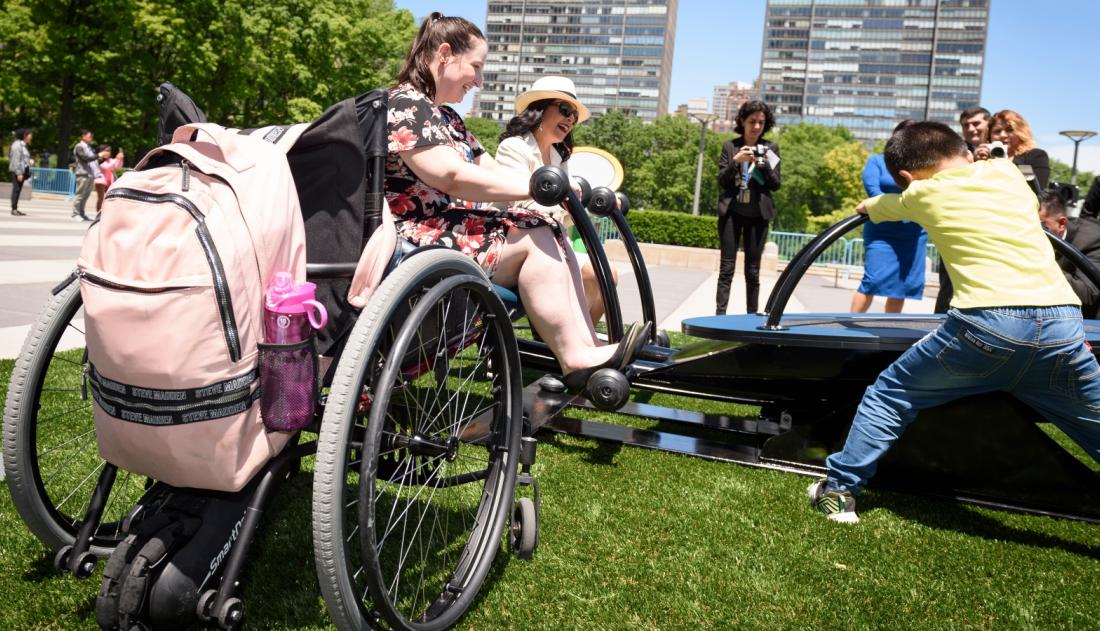
With the devastating impact of COVID-19, cities everywhere are facing key challenges in ensuring that the basic needs of people living in hardship are met. As cities implement actions to strengthen public services in the face of the pandemic, they must also provide equal access to technology, education, livelihoods and services that strengthen the health and well-being of all, with particular focus to the most vulnerable social groups to leave no one behind.
Early this year, the UN World Social Report reported that even before the impact of the COVID-19 pandemic our world faced historically high levels of inequality. Persons with disabilities are particularly vulnerable to rising inequality and poverty. Of the nearly 1 billion persons with disabilities, an estimated 80% live in cities across developing countries, often in poverty.
Innovation and dialogue can be catalysts for change to ensure that our cities and communities are resilient, particularly in times of crisis like the present COVID-19 pandemic. United Cities for All serves as an annual platform for experts to share their knowledge and identify innovative solutions to the challenges that cities are facing to build back better and offer accessible and usable infrastructure, services, information and more.
In September 2019, during the UN Secretary-General’s SDG Summit, Heads of State agreed on a Political Declaration adopted by the UN General Assembly called for accelerated progress on the SDGs and committed to “Leaving no one behind: we will place a focus on the poorest and most vulnerable in our policies and actions” while “Bolstering local action to accelerate implementation”. The Political Declaration also commits us to “empower and support cities, local authorities and communities in pursuing the 2030 Agenda”.
SDG 11, “Sustainable cities and communities”, aims at enhancing “inclusive and sustainable urbanization and capacity for participatory, integrated and sustainable human settlement planning and management in all countries” (Target 11.3), and calls for the provision of “universal access to safe, inclusive and accessible, green and public spaces, in particular for women and children, older persons and persons with disabilities.” (Target 11.7).
Persons living with disabilities are often the poorest and most vulnerable in cities today. While obstacles exist to achieve the SDGs for persons with disabilities, sub-national governments in cities are enabling this progress. However, scaling up the inclusion of and accessibility of persons with disabilities across cities and communities today is an imperative to leave no one behind. This webinar will examine current trends, responses and lessons to accelerate SDG progress for citizens living with disabilities and make inclusion and empowerment a reality for all.
Registration Link:
Documents and Readings
Concept Note (Updated as of 27 October 2020)
Organizers
This webinar is organized by the United Nations Department of Economic Affairs (UN DESA) Division for Sustainable Goals (DSDG) and its United Nations Office for Sustainable Development (UNOSD) in partnership with the UN DESA Division for Inclusive Social Development (DISD).
Objectives and Content
Organized by the United Nations Department of Economic Affairs (UN DESA) Division for Sustainable Goals (DSDG) and its Office for Sustainable Development (UNOSD) in partnership with the UN DESA Division for Inclusive Social Development (DISD), this webinar is as part of the IVth Edition of United Cities for Al - 2020, marking the celebration of the World Cities Day 2020, and taking a focus on Leaving No One Behind: Persons with Disabilities and Inequalities in our Cities and Communities.
This webinar is also part of a series of online webinars exploring specific sessions under the United Nations Office for Sustainable Development’s 2020 International Mayors Forum. The 2020 International Mayors Forum examines the social, economic and environmental impacts of the current crisis on cities and local governments as well as potential solutions for sustainable response and recovery.
This webinar aims to provide local governments and local actors with the knowledge to help them go in that direction, supporting a swift recovery from COVID-19 and advancing the decade of action and delivery for sustainable development. Local governments are currently facing multiple challenges in reducing inequality and vulnerability. This webinar will focus on accelerating progress for the inclusion of persons with disabilities and universal design in cities and communities to leave no one behind.
Target Audience
This webinar aims to engage sub-national government representatives and national institutions, as well as civil society, private sector and local leaders across UN Member States.
The webinar also seeks to ensure the participation and contribution of non-government experts working in the areas of national to local SDG implementation, access to persons with disabilities, urban mobility, planning, and management, as well as legislative and legal aspects related to the urban space and services. Academia, youth, elderly persons, experts and non-experts engaged in or concerned by the theme of making our cities and communities more inclusive and sustainable and accelerating local solutions for delivering the 2030 Agenda in the Decade of Action are also welcomed to join.
Opening Remarks
- Mr. Chun Kyoo Park, Head, UN Office for Sustainable Devbelopment, UN DESA (video message)
Moderator
- Mr. Amson Sibanda, Chief, National Strategies and Capacity Building Branch, Division for Sustainable Development Goals, UN DESA
Speakers
- Ms. Daniela Bas, Director, Division for Inclusive Social Development, UN DESA (video message)
- Mr. Victor Kalise, Commissioner, Mayor's Office for People with Disabilities, City of New York, USA (video message)
- Dr. Deisi Kusztra, President, World Family Organization
- Mr. Johny Tom Varghese, State Commissioner for Persons with Disabilities, State of Tamil Nadu, India (video message)
- Mr. Murali Padmanabhan, Disability Inclusion Advisor, Light for the World
For more information:
For any questions or comments please contact Mr. Jean D’Aragon (daragon@un.org), Senior Sustainable Development Expert, United Nations Office for Sustainable Development (UNOSD), Ms. Sara Castro-Hallgren (sara.castrohallgren@un.org), Programme Management Expert, UNOSD, and Mr. Amine Lamrabat (lamrabat@un.org), Associate Public Information Officer, Division for Inclusive Social Development, UN Department of Economic and Social Affairs.
 Welcome to the United Nations
Welcome to the United Nations


